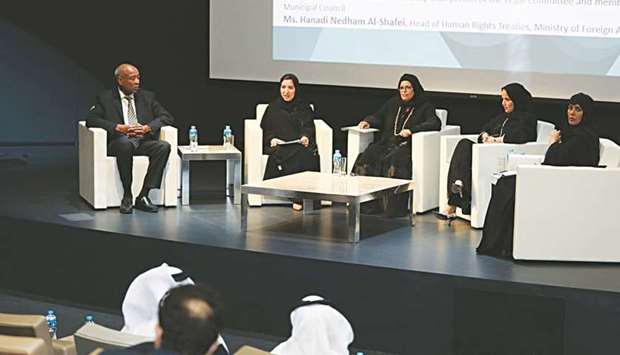The Department of Human Rights of the Ministry of Foreign Affairs, in co-operation with the Doha International Family Institute, a member of the Qatar Foundation for Education, Science and Community Development, organised a forum on Qatar’s accession to the Convention on the Elimination of All Forms of Discrimination against Women.
“The forum, held at the National Museum of Qatar, included two panel discussions on “The Convention on the Elimination of All Forms of Discrimination against Women: Progress of the State of Qatar” and “The Way Forward: Priorities for the Advancement of Women’s Rights in the Next Decade”.
In a statement at the opening session of the forum, Hanadi al-Shafei, head of Human Rights Treaties Department at the Ministry of Foreign Affairs, said Qatar acceded to the convention in April 2009.
Qatar is keen on empowering women and providing support and an environment that will enhance their political, civil, social, economic and cultural rights, indicating that this interest was reflected in Qatar National Vision 2030 and in the first national development strategies (2011-2016) and 2018-2022, she said.
She also stressed that the national legislation issued in recent years reflected the increasing interest of the State in promoting and protecting women’s rights and eliminating discrimination between them and men and establishing the rules of equality in all fields.
She also pointed to the empowerment of Qatar and its interest in the role of women, through the accession of four women to the membership of the Advisory Council, and doubled the number of women in the judiciary, the prosecution and the diplomatic corps.
Al-Shafei noted that Qatar has affirmed its full commitment to implement its obligations under the United Nations Convention on the Elimination of All Forms of Discrimination against Women and to co-operate fully with the Committee on the Elimination of Discrimination against Women and other international and regional mechanisms.
She pointed out that the state’s interest in empowering women exceeded national frameworks, with many initiatives being launched at the regional and international levels.
Qatar also supported the Declaration of “Charlovaa” on the provision of quality education for girls and pledged to provide education for 1mn girls by 2021.
Al-Shafei also said that Qatar plays an active role at the international level in the promotion and protection of women’s rights and empowerment, noting the financial support provided by Doha to a number of international initiatives in this area, including support for the main resources of the United Nations Gender Equality and Empowerment of Women, Peace and Security, as well as the publication of the book Hakayatah (Her story), which documents the contributions of leading women in the United Nations in promoting peace and security efforts.
Dr Sharifa al-Emadi, Executive Director of the Doha International Institute for the Family, said in a statement that the purpose of the event was to highlight the role played by the Convention and national policies over the last 10 years and praised the efforts of the Ministry of Foreign Affairs to highlight the role of Qatari women in all international platforms.
Dr Hessa bint Khalifa al-Thani, Special Envoy of the secretary-general of the Arab League for Humanitarian Relief, said that women’s representation in the workplace was higher than that of men, noting that there were many opportunities for Qatari women even before the ratification of the Convention on the Elimination of All Forms of Discrimination against Women Discrimination against women in education, higher education or employment.
“Her Highness Sheikha Moza bint Nasser has taken the lead in introducing initiatives and leading the progress of women’s rights in terms of quality and quantity,” she said.
Qatari women held positions at the international and regional levels, and offered her experience as Special Envoy of the secretary-general of the Arab League for Humanitarian Relief.
“The State of Qatar is committed to the cause of women’s empowerment since the founding of the modern Qatari state,” said Nur al-Maliki al-Juhani, a former member of the Committee on the Elimination of Discrimination against Women.
The situation of women in Qatar has undergone a major shift since the mid-1990s, she added.
She stressed that there is a strong political will on the part of the state leadership to take measures and enact legislation enabling women, in addition to providing the state with women as leaders, taking effective measures to eliminate discrimination against them, and internationally recognised achievements in education and health.
Najat al-Abdullah, Director of the Family Affairs Department at the Ministry of Administrative Development, Labour and Social Affairs, said that the ministry is working to achieve the social protection sector strategy to reach an integrated and effective social welfare system that includes all sectors of society including women.
HE Sheikha Najwa bint Abdulrahman al-Thani, Director of the International Co-operation Department of the National Human Rights Committee (NHRC), affirmed that the NHRC is an independent body that receives complaints concerning human rights, including women, noting that Qatar has received many accolades as a leading country in the region.
Mansour al-Saadi, Executive Director of the Centre for Protection and Social Rehabilitation, spoke about the continuous review and development of legislation relating to women’s issues and the Human Resources Law regarding women’s allowances and rights.
Sheikha bint Yousif al-Jefairi, chairwoman of the Legal Committee, member of the Central Municipal Council, presented her experience in the Municipal Council elections, indicating that the Constitution and the law in Qatar gave women the right to participate as candidates and voters.
This confirms the unlimited support of the State leadership for women and its interest in her participation in the elections.

Participants attending the forum on Qatar’s accession to the Convention on the Elimination of All Forms of Discrimination against Women.
